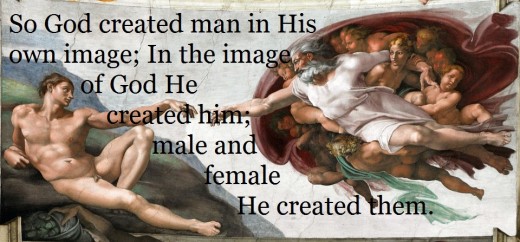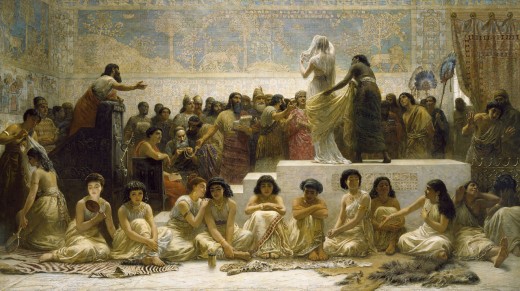He God

Is God Masculine?
From its first page to last, the Bible uses masculine language almost exclusively in reference to God.
Assuming the masculine designation is a significant part of God’s revelation regarding himself, what traits of masculinity would He seek to be associated with, and why would those traits determine Gods designation as a ‘he’, ‘husband’, ‘father’, rather than those traits decidedly more feminine designate their creator as a ‘she’, ‘wife’, ‘mother’?
Do you perceive God as more masculine, feminine, or neither?
“For your Maker is your husband...”
— Isaiah 54:5God appears to use designations within scripture as allegorical functions to define himself, rather than literal definitions (he is not an actual male)
'God is not a man, so he does not lie. He is not human, so he does not change his mind...' (Numbers 23:18)
He doesn't use these designations as mere ornaments of title. Rather these labels help us conceptualise God; his nature, his purposes and our relationship with him. I suspect Gods use of the masculine serves a similar purpose, helping us conceive of Him in relationship to humanity. He is the masculine, humanity the feminine. He is the giver and provider, mankind the receiver and beneficiary. For thousands of years this was a significant comparison, and a biblical analogy endorsed throughout scripture. Yet it remains an analogy frequently distorted. For example: human males have historically attributed their natural strengths as a divine declaration of superiority; and therefore license to dominate and subjugate women. A perspective no doubt damaging to God’s intended purpose in adopting a masculine association.

Viewing such distorted gender perspectives through the lens of our modern culture, it is not hard to comprehend why people struggle today with the concept of a 'manly' God. Yet, maybe the struggle lays less with God choosing the masculine nomenclature than our immature perceptions (and reactions) as to why he does so.
Does The Bible Need Gender Amending?
Some, it seems, attempt to counter the Bible’s use of masculine terms for God by emphasising those passages where feminine imagery is used instead: God is like a bear with her cubs (Hos 13:8); or a comforting mother (Is 66:13); or a woman in labour (Is 42:14).
Such verses are important to recall, yet such verses do not license us to alter biblical language—to mix in feminine pronouns, for example, or call God "mother". Indeed He is like a mother in some ways, but Scripture tells us that he is the Father. And God alone has the right and the means to tell us how the analogies of creation work.
Only God knows how to use the symbols he has created to talk about himself.
— Andrew MoodyGod's Genius In Creating Genders
Part of the genius of God's creation is the power it has in revealing simple truths about Him relative to us.
And perhaps none as poignantly as the intended understanding of God we can gain from the roles we live as men and women, boys and girls.
Only from within our experience of being male or female can God's masculine designation be interpreted. In other words, by referring to himself in the masculine, God makes deliberate comparison with something we were created to intimately experience; our own maleness or femaleness.
Matthew 6:9
“Our Father in heaven, hallowed be your name...”
Of course, it must be remembered that the bible also describes humans as fallen. A race oriented to trusting their carnal natures as a reliable guide. This orientation, however, is not the result or dictate of God's will, but rather our earliest ancestors choice to ignore that will (Romans 5:12). In that sense it is a disorientation, reflective of a race that has become lost; though often feeling sure of their direction (Proverbs 14:12).
So although humans are morally sensitive and aware, we also make wrong choices that fall well outside the image of the God we were designed to reflect. The further we remove ourselves from God, the more awry our innate moral choices become, resembling less and less His perfect nature and will.
We see a modern example of this in the confidence with which many are now asserting that Gender is fluid, that gender was never inspired by divine will and purpose but is solely at the mercy of human interpretation.
Sadly, as with Adam and Eve, whenever human will clashes with God's creative order, there always results confusion and darkness and chaos.

Do The Genders Relate Differently With God?
Human brokenness aside, when we are talking of Gods designation as masculine, we are not implying that such a designation fully describes Him. In fact scripture is clear that God deemed His image best represented on earth through the creation of two counterpart genders coming to live as one while not one; perceiving together but differently; meeting one another’s equal but variant needs. Some have even suggested the interesting concept that the male and female were created to reflect different persons in the Godhead.
This may explain why women are statistically more likely to develop a spiritual consciousness earlier than men. Their inherent femininity is attracted to those aspects of God in whose perfect image woman’s earthly counterparts were first created. Further, their feminine orientation for relational connectedness funds their desire to know God and be loved by Him. In other words their femaleness may help them identify with God, because He demonstrates all that is desirable and relationally perfect in maleness.
On the other hand, men may not initially identify with God's masculinity through the lens of compatibility but rather through the lens of comparison. Comparison with their own maleness. They measure their own maleness by what they understand God's definition of His own is.
Is God Genderless?
Why Did God Create Genders?
In what way might this composite earthly image (male and female) reflect their Makers nature or purpose?
This is maybe best answered when we consider that God has been a relational being from all eternity. God is love (1 Jn 4:8) is a concept that only makes sense within the context of His Triune nature. For by definition love requires others. If God's nature consisted of only one person, how could it be said that He is love? But from eternity, the three persons of the Godhead have perfectly loved one another.
God is inherently relational. He is in relationship with himself. Father, Son and Holy Spirit are equal in essence, value, and authority but are still distinct. The Bible reveals that distinction based on roles. The Father, Son and Holy Spirit interact with each other by playing different roles in carrying out the single will of God. If gender differences are intended to reflect God’s relational nature, they must reflect distinct roles not varying levels of authority.
— Matthew R.BrooksThe Heavenly Sublimity Of Love
Likewise, humans reflect God's image most accurately when they love.
That said, sin has broken things. To quote Greg Boyd, “The moment Adam and Eve rebelled, they concealed themselves from each other and hid from God (Gen 3:7-10). When confronted by God about his sin, Adam first accused Eve, and then God for giving Eve to him (Gen 3:12). God then woefully proclaimed that because of their rebellion, the beautiful “one flesh” relationship he wanted couples to enjoy would be reduced to a manipulative power struggle. The wife would seek to manipulate and dominate her husband, and the man would end up lording over the woman...(vs. 16).”
Yet, even broken, there remains a deep heavenly equivalence in the male-female relationship, reflective of the loving nature of God. And, though fallen, we still acknowledge the relationship between a man and woman as one of the most sublime of earthly loves.
In the new testament we find the sublimity of this relationship compared to that of Christ and his Church.
...Wives submit to your own husbands ...the husband is head of the wife, as Christ is head of the church ...Husbands, love your wives, as Christ also loved the church and gave Himself for her ...So husbands ought to love their own wives as their own bodies ...For no one ever hated his own flesh, but nourishes and cherishes it, just as the Lord does the church. For we are members of His body, of His flesh and of His bones ...This is a great mystery: but I speak concerning Christ and the church.
— Ephesians 5:20fThe Importance Of Imitation
The spiritual significance of such passages get lost today amidst the alarms of inequality and sexism. But this is exactly where the crux of man's spiritual problems stem. People reject God because they do not want anyone, even God, dominant over them—even though God promises to love them and have only their best interests at heart.
Likewise, modern society rejects any idea of male dominance in marriage, even if that covenant is made in the understanding that the man will fulfill such a role sacrificially; putting the wife before himself.
Of course, fallen men cannot fulfill such a task perfectly, and yet the command to do so emphasizes that imperfect results matter less than the effort given to imitating Christ; reflective of a God (the masculine), who alone can perfectly love humanity (the feminine), and in particular the Church (the bride of Christ). And though the disparity between fallen men and women's efforts when compared to God is evident, it also highlights His perfectness.
From a worldly perspective, the idea of female submission to men in any form may seem offensive and understandably so in that whatever is not submitted to God is subject to perversion. A man's power not submitted to God and not functioning in love will most often result in control, abuse and selfish manipulation. However, when a couple together submits to the purposes of God in their corresponding roles it can gloriously exhibit how beautifully love really functions in God's Kingdom.
— Tamara SolomonsonTherefore there is purpose in the creation of the sexes beyond mere reproduction. After all, God could have chosen to create an asexual world; which from a purely reproductive perspective would have proven far more neat and harmonious.
But He didn’t.
Reading the creation account, one gets an impression that reproduction wasn’t key to God's reasons for creating genders at all; at least, not for humans. Nor tidy simplicity paramount to his design parameters. Something more primary to God's purposes motivated the creation of genders, something representative of His nature and intent. So, just as God deemed it better to create us than not create us (with all the dramas that would entail), so he deemed it better to create genders than not to. And better to have himself portrayed predominantly in the masculine, rather than feminine.
© 2019 Richard Parr








